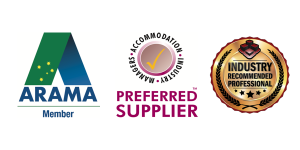Who hasn’t returned from a seaside apartment getaway and wondered, “how do I make this holiday-feeling more permanent?” Undoubtedly, a large percentage of management rights business owners began their business journey with this very thought.
While holiday rentals are only a percentage of an Australian industry estimated to be worth $4.8 billion (according to ResortBrokers’ Management Rights Industry Report 2022), management rights are widely considered as a ‘home-based’ business that can offer the trifecta of lifestyle, good return on investment and re-sale potential.
With approximately $120 billion in real estate assets currently under management in Australia and an increasing reliance on high density living and subsequent community title schemes to meet housing needs nationwide, management rights are generally considered, by investors and banks alike, to be a relatively safe business investment.
Overlay current accommodation market conditions with forecasts released by the federal government’s Tourism Research Australia agency that include:
Management rights businesses were pioneered by Gold Coast property developers in the 1970s to centrally co-ordinate the day-to-day maintenance and management of rental properties within community/strata title schemes (a number of individually owned lots within a defined development).
While a larger proportion of existing businesses are concentrated in Queensland, opportunities in other states are only increasing.
When you purchase a management rights business, you are typically buying:
There are several different types of management rights including:
It’s also possible to purchase ‘business only’ management rights that do not include an onsite manager’s residence.
The cost of the business will equate to the cost of the manager’s unit (if applicable) PLUS the value of the actual business, which is ascertained using a multiplier of the most recent 12-month period net operating profit (NOP).
The market value of the manager’s unit (often referred to as the manager’s lot) is determined by comparing unit sales within the complex and similar manager unit sales in surrounding complexes and then adding a premium (usually 5 – 10%) for the inclusion of an office or reception space.
The size of the multiplier is directed heavily by market conditions which includes the influence of banks and business valuers. Typically, the multiple ranges anywhere from 2.5 to 5.5 (although 6+ multipliers are not uncommon in today’s market) and can depend on:
Example: A NOP of $300K at a multiple of 4 would produce a business valuation of $1.2M. If the manager’s unit was valued at $850K then the total package price would equate to $2,050,000.
A typical loan to value ratio (LVR) in today’s marketplace is up to a maximum of 70%. This means a receptive bank or lender will lend up to 70% of the purchase price of the complete management rights business.
Keep in mind your deposit is only one part of the equation. The lending criteria of each bank or lender will differ slightly but things like your existing experience or transferable skills, composition of the letting pool, economic trends, balance of the term of agreements and so much more will all impact the success and subsequent terms of your finance approval.
A quality management rights business will always be in-demand and while the day-to-day pros and cons of living and working in the same space will weigh differently from one individual to another, some current market considerations may include:
Management rights buyers can fall into the trap of utilising their existing broker or banker to source business finance only to discover, too late, their lack of experience can mean serious delays, unnecessary extra costs or even decline.
While there may be many banks, only a few of these deal in management rights actively and your Green Team finance broker will know which ones.
When your broker is well armed with a thorough understanding of each bank’s lending criteria, they are in the best position to get those lenders competing for your business and ultimately negotiate a better finance deal on your behalf.
If your business needs funds for opportunity, growth or cash flow support, your experienced Green Team business finance broker will be in the best position to help you compare a range of solutions for your business.
Proudly recognised as a Management Rights industry preferred supplier:

THE FINEPRINT: The information provided on this site is on the understanding that it is for illustrative and discussion purposes only. While all care and attention are taken in its preparation any party seeking to rely on its content or otherwise should make their own enquiries and research to ensure its relevance to your specific personal and business requirements and circumstances.
Green Finance Group Pty Ltd ACN 145 035 221 is authorised under LMG Broker Services Pty Ltd ACN 632 405 504 Australian Credit Licence 517192.

"While my extensive industry experience covers all areas of banking, loans and leasing – commercial, equipment and residential – my business finance specialties are the broader hospitality, accommodation and childcare industries."
Fortitude Valley, Brisbane
Australia's leading hospitality, accommodation and childcare finance specialist and winner of Loan Market's Commercial Broker of the Year 2024.
Prior to establishing GFG in 2010, I occupied senior management roles in some of Australia's leading financial institutions including Commonwealth Bank of Australia, Suncorp, Bankwest and Westpac.